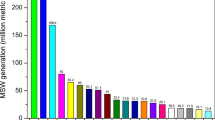Abstract
This study reports on experimentation with municipal and industrial solid waste in Brazil, on mutual inspection of municipal sanitation models in selected Spanish and Brazilian towns, and on observations of municipal solid waste (MSW) management models effective in Argentina, Great Britain, Sweden, and Germany. The diversity of management strategies inhibits technology transfer. Judging by the models inspected, Sweden and Germany appear to be best prepared for stricter European landfill diversion targets in the near future. Experimentation in Brazil has resulted in a proactive MSW management model based on divided collection, which achieves 80 percent landfill diversion. This result, surprisingly, meets and exceeds European diversion targets in a South American context. As the gap in strategy and target narrows between South America and Europe, both technology and management methods may gain intercontinental mobility and thus enhance commercial ties between the two markets in the specific branch of MSW management.
Similar content being viewed by others
References
Calvo, R.F., Szanto, N.M., Muñoz, J.J. (1998) MSW management situation in Latin America (in Spanish). Residuos Revista Técnica, Bilbao 8(43), 70–6.
CELADE. (1999) Demographic Bulletin No. 62 for Economically Active Population. Santiago: Latin-American and Caribbean Demographic Center, www.popnet.org.
Fehr, M. (1999a) The dynamic nature of MSW management. J. Environmental Systems 27(1), 1–13.
Fehr, M. (1999b) Verification of the environmental matrix of a Spanish municipality (in Spanish), Cooperative project supported by AECI, Madrid, final report.
Fehr, M. and Calçado, M.d.R. (2001) Divided collection model for household waste achieves 80% landfill diversion. The Journal of Solid Waste Technology and Management, Chester 27(1), 22–26.
Fehr, M. and Castro, M.S.M.V.d. (1999) Household waste analysis induces management model (in Portuguese). Saneamento Ambiental, São Paulo 10(55), 38–41.
Fehr, M., Calçado, M.d.R., Romão, D.C. (1999) Landfill diversion of biodegradables seen and solved as an administrative challenge. First Internet Conference on Material Flow Analysis of Integrated Bio-Systems, United Nations University, March to October 2000, paper P6-4.
GEDESMA. (1998) Selective collection of used packaging material in Madrid (in Spanish). Residuos Revista Técnica, Bilbao 8(43), 56–8.
IBGE. (1997) Brazil in numbers (in Portuguese) 5, pp. 1–137, Rio de Janeiro: IBGE.
Read, A.D. (1999) A weekly doorstep recycling collection, I had no idea we could. Resources Conservation and Recycling 26(3-4), 217–49.
Roggio-Ormas. (1997) Environmental engineering group, Bahía Blanca, Argentina, institutional video.
Sakai, S., Sawell, S.E., Chandler, A.J., Eighmy, T.T., Kosson, D.S., Vehlow, J., van der Sloot, H.A., Hartlen, J., Hjelmar, O.(1996) World trends in MSW management. Waste Management, Skaneateles 16(5), 341–50.
Author information
Authors and Affiliations
Rights and permissions
About this article
Cite this article
Fehr, M. The Prospect of Municipal Waste Landfill Diversion Depends on Geographical Location. The Environmentalist 22, 319–324 (2002). https://doi.org/10.1023/A:1020710829477
Issue Date:
DOI: https://doi.org/10.1023/A:1020710829477




